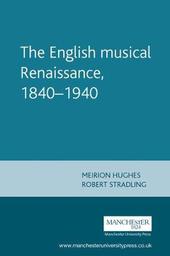
|
The English Musical Renaissance, 1840-1940
Paperback / softback
Main Details
| Title |
The English Musical Renaissance, 1840-1940
|
| Authors and Contributors |
By (author) Meirion Hughes
|
|
By (author) Robert Stradling
|
| Series | Music and Society |
|---|
| Physical Properties |
| Format:Paperback / softback | | Pages:336 | | Dimensions(mm): Height 216,Width 138 |
|
| Category/Genre | Romantic music (c 1830 to c 1900)
20th century and contemporary classical music |
|---|
| ISBN/Barcode |
9780719058301
|
| Classifications | Dewey:780.942 |
|---|
| Audience | | Undergraduate | | Postgraduate, Research & Scholarly | | Professional & Vocational | |
|---|
| Edition |
2nd edition
|
| Illustrations |
Illustrations, black & white
|
|
Publishing Details |
| Publisher |
Manchester University Press
|
| Imprint |
Manchester University Press
|
| Publication Date |
9 August 2001 |
| Publication Country |
United Kingdom
|
Description
In this work Robert Stradling and Meirion Hughes argue that research into the cultural history of music can significantly help our understanding of the evolution of English national identity. The authors study the evolving life of music in this period for the mainsprings of its meaning, power and function, reviewing its history and finally deconstructing its established meanings. By the turn of the century music had come to represent the privileged elite. At the same time, it was seen as a stronghold of national values, struggling to escape alien influences - above all that of Germany - and reflecting the reassuring "Englishness" of middle-class life, its aesthetic qualities celebrated as national achievemnets and as criteria of a secure and civilized empire. This work isolates and identifies the intellectual, social and political assumptions which surrounded English music in the early part of the 20th century, and the relates the "renaissance" to its true cultural context.
Author Biography
Robert Stradling was Professor of History at the University of Wales, Cardiff; Meirion Hughes is a freelance historian and lives in London
Reviews"'Our music, as at the Proms, confirms an ironic chauvinism or encourages a cosy insularity. This book, very eloquently, sets it all down.' Anthony Burgess; 'A quite remarkable book, remarkable in its wealth of cultural cross-reference and in the bouncy exuberance with which it is written... An invaluable correction to all that has gone before.' English Historical Review"
|